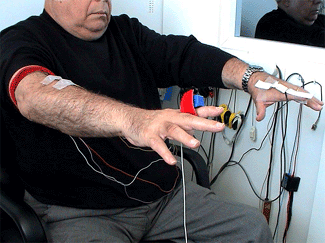Amantadine, ineffective against essential tremor

Involuntary shaking of the hands, legs, voice or head. These are symptoms associated with essential tremor, a disorder which while not severe, affects the quality of life of those suffering from it, generally those over 60. One of the drugs that was, up to now, thought of as being potentially effective in treating the disorder, amantadine, has been shown to be ineffective and even detrimental, in a study carried out by researchers at the Hospital de Sant Pau.
Involuntary shaking of the hands, legs, voice or head. These are symptoms associated with essential tremor, a disorder which while not severe, affects the quality of life of those suffering from it, generally those over 60. One of the drugs that was, up to now, thought of as being potentially effective in treating the disorder, amantadine, has been shown to be ineffective and even detrimental, in a study carried out by researchers at the Hospital de Sant Pau.
Essential tremor is the most common movement disorder, with an incidence ten times higher than that of Parkinson's. This frequent disorder is characterized by the presence of involuntary shaking of the hands, legs, voice or head. It tends to appear after the age of 60. It is not a severe illness, but it does limit everyday and work activities. At present this neurological illness does not have a good drug treatment, given that drugs do not control the symptoms adequately. We need to research into new therapies.
Amantadine is an antiviral drug which appeared over 20 years ago. Apart from its antiviral activity it has been suggested to be effective in treating the symptoms of Parkinson’s and also fatigue in multiple sclerosis. In addition, at the beginning of the 80 three uncontrolled studies were described which referred to an evident improvement in the symptoms of essential tremor, and it was proposed as a possible therapy for this illness. However, the lack of economic interest on the part of pharmaceutical laboratories due to the low price of the drug meant that controlled studies were not encouraged and the effectiveness of the drug was never confirmed in the treatment of essential tremor.
Ours has been a self-financed controlled, double blind, randomised and placebo- controlled study. 16 patients affected by moderate essential tremor took part. We used a dose of 200 mg of amantadine per day. The treatment was carried out in a crossed manner over 14 consecutive days followed by a week without treatment, and later 14 days with treatment with placebo. The intensity of the tremble was measured on clinical scales, acelerometer readings and a disability scale used by the patients themselves. Assessments were made at day 0 (before commencement of treatment) and at day 15 (after 14 days’ treatment). The assessing doctor was blind (who did not know the treatment (amantadine or placebo) the patient was taking).

Handwriting of a patient affected by essential tremor.
When comparing the effect of amantadine and the placebo, the study showed there were no differences in any of the parameters studied. However, 37.5 % of the patients noted a worsening of the tremble when they were being treated with amantadine.
Therefore, from the results of this study we can conclude definitively that amantadine is not effective in the treatment of essential tremor and may even worsen the symptoms.
Alexandre Gironell
References
Article: "Effect of amantadine in essential tremor: A randomized, placebo-controlled trial". Gironell, A; Kulisevsky, J; Pascual-Sedano, B; Flamarich, D. MOVEMENT DISORDERS, 21 (4): 441-445 APR 2006

